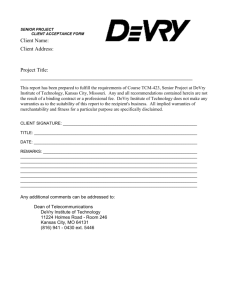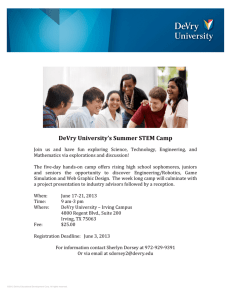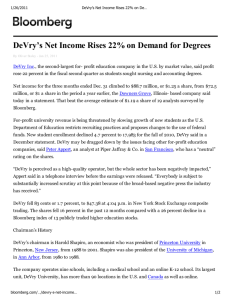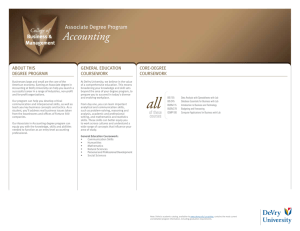DeVry University—IBHE 2006 Institutional Performance Report
advertisement
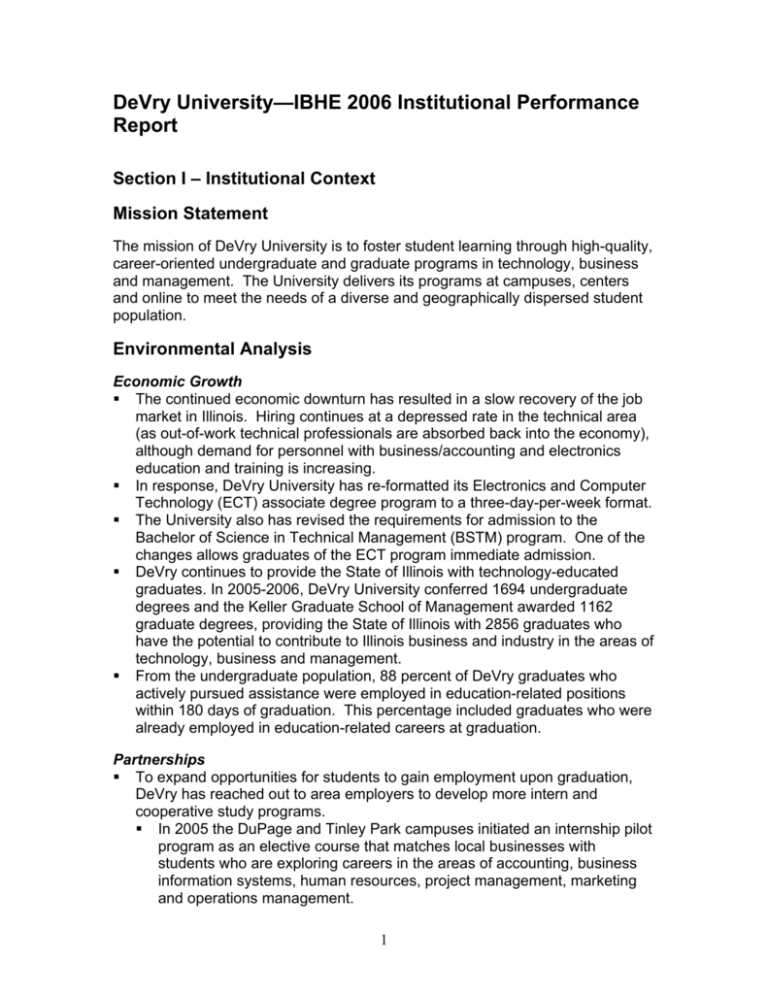
DeVry University—IBHE 2006 Institutional Performance Report Section I – Institutional Context Mission Statement The mission of DeVry University is to foster student learning through high-quality, career-oriented undergraduate and graduate programs in technology, business and management. The University delivers its programs at campuses, centers and online to meet the needs of a diverse and geographically dispersed student population. Environmental Analysis Economic Growth The continued economic downturn has resulted in a slow recovery of the job market in Illinois. Hiring continues at a depressed rate in the technical area (as out-of-work technical professionals are absorbed back into the economy), although demand for personnel with business/accounting and electronics education and training is increasing. In response, DeVry University has re-formatted its Electronics and Computer Technology (ECT) associate degree program to a three-day-per-week format. The University also has revised the requirements for admission to the Bachelor of Science in Technical Management (BSTM) program. One of the changes allows graduates of the ECT program immediate admission. DeVry continues to provide the State of Illinois with technology-educated graduates. In 2005-2006, DeVry University conferred 1694 undergraduate degrees and the Keller Graduate School of Management awarded 1162 graduate degrees, providing the State of Illinois with 2856 graduates who have the potential to contribute to Illinois business and industry in the areas of technology, business and management. From the undergraduate population, 88 percent of DeVry graduates who actively pursued assistance were employed in education-related positions within 180 days of graduation. This percentage included graduates who were already employed in education-related careers at graduation. Partnerships To expand opportunities for students to gain employment upon graduation, DeVry has reached out to area employers to develop more intern and cooperative study programs. In 2005 the DuPage and Tinley Park campuses initiated an internship pilot program as an elective course that matches local businesses with students who are exploring careers in the areas of accounting, business information systems, human resources, project management, marketing and operations management. 1 The Chicago campus plans to launch this internship program in fiscal year 2007 because of its success with both students and local businesses. The University also is nurturing relationships with small and mid-sized companies in the Chicago metropolitan area where the need for employees educated as electronic technicians and service/maintenance personnel is growing. These tend to be jobs unaffected by overseas outsourcing. The Chicago campus has a strong relationship with the Chicago Public School system and continues to expand the CollegeExcel program that offers high school students the opportunity to take college-level courses. The University also offers a variety of other workshops and programs through its three Chicago-area campuses in conjunction with the Chicago Public Schools and Chicago-area businesses to provide technical education and college-level experiences to high school students and teachers. In addition, DeVry University partners with Chicago-area community, junior and city colleges and participates with numerous college-related fairs each year in order to increase awareness of educational and career opportunities. Affordability During the past five years, student aid funding has remained relatively flat from federal sources and decreased from the State of Illinois, creating an ever-increasing unmet need gap for students. This funding gap has lengthened the time many students take to complete their degrees and has caused many moderate- to low-income students to interrupt their studies to work full-time before they return to complete their degrees. Others are able to continue attending but must do so on a part-time basis. In addition, students are more likely to attend more than one institution to complete their degrees, due to cost and course scheduling. Illinois, along with most other states, experienced severe budgeting crises in the post 9/11 economic depression, resulting in decreases in funding for the MAP grant program and several changes in the awarding structure. In the current year, funding for the MAP grant and other Illinois Student Assistance Commission (ISAC) programs remains strained. For fiscal year 2005-06, the MAP program used an across-the-board reduction of 9% in all awards, basing award amounts on 2003-04 tuition rates for all schools. In fiscal year 2006-2007, the MAP program first reduced than then eliminated the 9% reduction in awards. However, this full MAP award of $4,968, although 10% higher than the 2005-2006 award of $4,520, is still only at the maximum MAP award of 2001-2002. State budgeting uncertainties make it difficult for student financial aid advisors to give students a finalized award package for MAP after an August deadline each year (in 2006, August 26) and, in some cases, this uncertainty prevents students from enrolling in DeVry’s November classes. At the federal level, student aid has increased nominally over the past five years with the maximum Pell grant award growing by the smallest increments. 2 Student loan debt has risen dramatically and the level of funding for Pell grants combined with cuts in the MAP grant program has created serious funding gaps for low-income students. These funding gaps are so large that even borrowing the annual maximum Stafford loans limits, which have remained unchanged since 1993, are not enough to bridge the gap for many low-income students. As a result, many students are turning to alternative loans that are more expensive and often require a co-signer. The traditional college financial aid ideal has changed and instead of looking for one or two resources to pay for college, students now may need as many as five. Prospective students need to start their search earlier and consider more colleges; students and their parents need to become more credit savvy consumers in saving and paying for college; and both financial aid and admissions officers will need to make an increased effort to prepare students to both start and finish college. To respond to affordability issues in 2005-2006, DeVry initiated a pilot tuition freeze program. For all full-time students entering DeVry in the summer July 2005 class, tuition would remain at the 2005-2006 rate for basically as long as they attended DeVry as full-time students. Of the 515 eligible students enrolling at one of the three DeVry Illinois campuses in July 2005, 346 (67%) were eligible at the end of the 2005-2006 school year to continue into 20062007 with the tuition freeze option. Also in fiscal year 2005-2006, DeVry initiated another pilot program in Illinois – the 21st Century Grant. This grant addresses affordability to more needy students who see DeVry as a valuable educational opportunity but are having difficulty affording private tuition. DeVry is also looking at developing scholarship programs to target part-time students and developing special pricing structures for students who have already earned an associate degree. Diversity More than a quarter of DeVry’s undergraduate students in Illinois are reported as Hispanic, nearly one-fifth as African American and about one-tenth as Asian. Totals show that minority students make up almost 50% of DeVry’s student population at the Illinois campuses. Following is a chart of populations at each of DeVry University’s Illinois locations: Location Addison Chicago Tinley Pk Caucasian 62% 20% 48% Af-Am 14% 38% 38% Hispanic 12% 33% 9% Asian 12% 7% 5% Nat-Am >1% 1% >1% Gurnee Loop Merrillville Naperville 61% 19% 55% 61% 23% 63% 35% 20% 12% 15% 8% 11% 4% 3% 1% 7% 0% 0% 1% 1% 3 Oak Brook O’Hare 55% 42% 22% 27% 14% 18% 9% 13% 0% 0% To maintain a rich diversity in its student body, DeVry builds enrollments that reflect the diversity surrounding each Chicago metropolitan area campus. This is done through high school outreach programs, attendance at college fairs, participation in community, social service and ethnic events, and advertising in ethnic publications. DeVry also has developed its Advantage Academy in partnership with the Chicago Public Schools system, a program that brings high school juniors and seniors to the Chicago campus to complete their last two years of high school while earning an Associates Degree in network Systems Administration. The first cohort group graduated in June 2006; 115 students representing gender and ethnic diversity participated in the program in 200506 and 81% earned both their high school diplomas and their associate degrees. In addition, DeVry employs a Multicultural Outreach Representative responsible for building relationships in the local ethnic communities. Finally, DeVry offers convenient access to classes at multiple locations, campuses and centers across the wide geographic Chicago area, providing flexible schedules and multiple delivery modes for most programs and resulting in enhanced appeal of a DeVry education to both traditional and nontraditional students from diverse populations. Quality With the recent scrutiny of not only proprietary schools but also business in general, DeVry has taken steps to insure its reputation for the highest quality of administrative practices and academic excellence. The University hired a Chief Compliance Officer at the corporate level during the past year. He is responsible for ensuring the highest levels of quality, ethics and governance within the University. DeVry also instituted internal controls to assure compliance with the Sarbanes-Oxley Act in virtually all areas, including registration, finance, human resources, payroll, accounts payable, student finance, and career services. While the requirements of the Sarbanes-Oxley Act have brought about many positive changes in DeVry’s business infrastructure, they also have placed additional burdens on many staff members in the University’s corporate office and on the Illinois campuses. The University has greatly improved the integrated student information system (ISIS), launched in 2003. The system offers students greater access to grades and a record of their progress toward the completion of their degrees. It also gives them the ability to register for any course in the DeVry system online. On the administrative side, the system offers better organization and efficiency to both faculty and staff. 4 Productivity/Cost Effectiveness/Accountability With increased competition, DeVry University’s Illinois locations are striving to increase productivity and cost effectiveness in order to offer students high quality education at affordable prices. A recent review of market opportunities shows that increasing enrollments will allow the University to curtail escalating costs. DeVry is approaching this goal in several ways: Launching an aggressive recruiting program targeting high school students, transfer students and adult learners Forging articulation agreements with community colleges and other institutions of higher learning in the area Developing scholarship programs targeting part-time students Adopting special pricing structures for students who have already earned associate degrees Improving transfer information on the web to include information on scholarships, articulation agreements and the like To improve productivity, cost-effectiveness and accountability, DeVry University consolidated all Chicago metropolitan area alumni career services for undergraduates and graduate students with a newly created Associate Dean of Alumni and Graduate Career Services in 2006. The Career Services Departments at the suburban campuses are now fully staffed and work together to support the career advising, career fairs, and job-lead development for students at the two suburban campuses, the five DeVry University Centers and the Midwest graduates matriculating from DeVry’s online operations. The University’s Career Services also consolidated all part-time, co-op and full-time job services into one department. The consolidation has resulted in improved serviced to students, increased efficiency for staff, and cost savings. In addition, the University instituted its Online Library Services program within the past year to improve productivity and enhance services to students. Structured to support on-campus and off-campus students, the program provides bibliographic instruction sessions, online tutorials and pathfinders and real-time, online reference services. Section II – PROGRESS REPORT POLICY AREA ONE: Higher education will help Illinois sustain strong economic growth through its teaching, service, and research activities. COMMON INSTITUTIONAL INDICATORS Percent of undergraduate degree/certificate recipients either employed or enrolled in further education within one year of graduation 5 Number Employed and/or Enrolled* Number of Survey Respondents# Percent Employed and/or Enrolled+ 1960 100% 88% a) Institutional goal(s) for this indicator: * This number represents undergraduate degree holders who completed in calendar year 2005 and who are employed and/or reported enrollment in additional programs (e.g., master’s-level programs). # All students are required to register with the Career Services department prior to graduation. + From the undergraduate population, 88 percent of DeVry graduates who actively pursued assistance were employed in education-related positions within 180 days of graduation. This percentage includes graduates who were already employed in education-related careers at graduation. The percentage of “all employed would be higher, however DeVry does not track employment statistics by “employed.” b) Brief interpretation of institutional performance and related implications: The statistic of 88% of undergraduate level graduates employed in educationrelated positions means that DeVry significantly contributed to the business, management, and technical employment sectors. POLICY AREA TWO: Higher education will join elementary and secondary education to improve teaching and learning at all levels. COMMON INSTITUTIONAL INDICATORS Annual number of undergraduate students completing requirements for initial teacher certification by certificate area (Applies only to institutions with teacher education programs) DeVry University does not offer teacher education programs. 6 POLICY AREA THREE: No Illinois citizen will be denied an opportunity for a college education because of financial need. POLICY AREA FOUR: Illinois will increase the number and diversity of citizens completing training and education programs. COMMON INSTITUTIONAL INDICATORS Completions by race/ethnicity and gender Source: IPEDS Degrees Conferred Survey. [Supporting data is available on the IBHE website.] POLICY AREA FOUR Illinois Completions from July 1, 2004 thru Jun 30, 2005 Total DEGREE 3-Associates Gender Ethnicity 1 - Nonresident Alien 2- Black, non-Hispanic 3 - American Indian / Alaska Native 4 - Asian/Pacific Islander 5 - Hispanic 6 - White, non-Hispanic 7 - Race/Ethnicity unknown 3-Associates Total 5-Bachelors 1 - Nonresident Alien 2- Black, non-Hispanic 3 - American Indian / Alaska Native 4 - Asian/Pacific Islander 5 - Hispanic 6 - White, non-Hispanic 7 - Race/Ethnicity unknown 5-Bachelors Total 6-Certificate 1 - Nonresident Alien 2- Black, non-Hispanic 3 - American Indian / Alaska Native 4 - Asian/Pacific Islander 5 - Hispanic 6 - White, non-Hispanic 7 - Race/Ethnicity unknown 6-Certificate Total 7 1-Male 2Female 1 26 0 8 Grand Total 1 34 1 4 44 85 0 0 0 4 7 0 1 4 48 92 0 161 19 180 17 145 11 172 28 317 3 143 139 625 34 2 73 81 220 29 5 216 220 845 63 1106 588 1694 0 8 0 44 0 52 0 2 3 41 2 0 5 3 22 6 0 7 6 63 8 56 80 136 0 85 0 245 0 330 7-Masters Total 1 39 31 358 27 541 2 42 29 271 32 621 3 81 60 629 59 1162 Grand Total 1864 1308 3172 7-Masters 1 - Nonresident Alien 2- Black, non-Hispanic 3 - American Indian / Alaska Native 4 - Asian/Pacific Islander 5 - Hispanic 6 - White, non-Hispanic 7 - Race/Ethnicity unknown a) Institutional goal(s) for this indicator: To assist in meeting Illinois goals for the number and diversity of citizens completing training and education programs. b) Brief interpretation of institutional performance and related implications: DeVry continues to contribute to the number and diversity of citizens completing training programs. Policy Area Five: Illinois colleges and universities will be accountable for providing high quality academic programs and the systematic assessment of student learning outcomes while holding students to ever high expectations for learning and growth. Fiscal Year 2006 Accomplishments Health Information Technology Program The Health Information Technology (HIT) program at DeVry University prepares students to work with applications systems and manage electronic health information databases. Ever-cognizant of the importance of information accuracy, privacy and security, HIT professionals may be involved in ensuring that the design and use of information systems support patient safety. They work with nurses, hospitals, physician practices, long-term-care facilities, home healthcare agencies, insurance and managed care organizations, government agencies and vendor firms. The HIT Program at DeVry Chicago has a number of processes that are designed to assure quality: Accreditation by the Commission on Accreditation of Healthcare Informatics and Information Management Education (CAHIIM) – This independent 8 accrediting body performed an initial review on the HIT Program in April 2006. A written report from this review indicates that accreditation will be granted shortly. Annual Reports to CAHIIM – Accredited programs are required to submit annual reports to CAHIIM with updated results on graduate surveys, employer surveys, passage rates on the national certification exam, enrollments, attrition, etc. in order to assess ongoing quality and identify any areas of concern. Program Evaluation Plan – The HIT program has a formal evaluation plan that is based upon quality indicators and outcomes. Results of this evaluation plan are reviewed, and must be reported to the accrediting agency, annually (see above). Advisory Board Meetings – The HIT program has an active advisory board that meets twice a year to review program progress and provide input on quality improvement. Annual Program Review – The HIT program undergoes an annual program review through the University, which looks at various outcomes and quality indicators, the assessment of which results in an action plan for quality improvement. DeVry Online Keller Graduate School of Management of DeVry University delivers courses in either a “blended” or “all online format”. The all-online format integrates today’s high-tech capabilities with the University’s proven methodology. Online activities may include direct interaction with faculty and other students (e.g., online discussion, group projects and case studies) as well as activities completed independently by students, with subsequent interaction with faculty (e.g., quizzes and research assignments). All course objectives and activities build on the University’s practitioner orientation and help prepare managers to understand and use Web-based tools to succeed in any business environment. To ensure uniformity of content and rigor in coursework delivered both onsite and online, the University taps the expertise of seasoned faculty members who have undergone specialized training designed to prepare them to teach via this medium. Faculty rely on proven curriculum guides to present their courses and then supplement course delivery with a variety of online instructional activities, all of which focus squarely on course objectives. Typical online learning technologies include the following: The online site, devry.net, which is accessible 24 hours a day and offers course syllabi and assignments, the virtual library and other Web-based resources Text and course materials, available through the online bookstore CD-ROM companion disks Study notes or “instructor lectures,” on the Web site for student review 9 Student academic performance for online courses is assessed through evaluation of contributions to team/group activities, participation in threaded discussions, and performance on individual assignments, projects, papers and case studies. By combining these activities with results from quizzes and exams, instructors build complete portfolios reflecting students’ mastery of course objectives. DeVry University’s undergraduate studies also include online classes, adding another option for Chicago area DeVry students seeking to complete degrees. During the Fall 2005 semester, Chicago-area students enrolled in a total of 2,548 online courses. The majority of those classes, 49 percent, were in business, another 29 percent were in general education courses and the remaining were in mathematics, computer information systems and others. Between Fall 2004 and Fall 2005, the number of online courses completed by undergraduate students at the three Chicago-area campuses has increased dramatically. Percentage of Growth from Fall 2004 to Fall 2005 Campus Chicago DuPage Tinley Park Percentage of Growth 47% 66% 78% This growth attests to the demand and success of online learning at DeVry University’s undergraduate level. Advantage Academy DeVry University’s Advantage Academy is a partnership program between the University and the Chicago Public School system that brings high school juniors and seniors to campus to complete their last two years of high school while earning an Associates Degree in Network Systems Administration. The first cohort group graduated in June 2006. Of the 115 students enrolled, 90% (104) earned their high school diplomas and 81% (93) earned their associate degrees. These graduation rates are significantly higher than the Chicago Public School rates. Six of the students who did not complete course requirements are registered for Summer 2006 Session A classes and will hopefully complete their studies by the end of August. Of the graduating students, 84% are planning to continue with college education and have enrolled at colleges and universities across the country. To date, 30 of 10 these students have applied to DeVry University to continue in a bachelor’s degree program. Recruitment for the Advantage Academy Cohort 3 (Class of 2008) is in the final stages and 120 students have been accepted. Of these students, 46 have a conditional acceptance based on completion of Skill Builder Course work. The Reading/Math/Writing Skill Builder Course began July 11 with 43 potential Advantage Academy Cohort 3 candidates. This course will be completed by July 27th and those who finish with 90% attendance and 80% proficiency will be eligible to join the Advantage Academy for its commencement in September. Keller Graduate Certificates in Education Management within the MBA Program Keller Graduate School of Management of DeVry University offers two Graduate Certificates in Educational Management within the Masters of Business Administration program. Working with leading educators and educational institutions, Keller designed these curricula to prepare students for successful careers in all areas of educational management. Classes are taught by active parishioners who incorporate into instruction the real-world skills and experiences that today’s educational leaders need. The Graduate Certificate in Management of Educational Corporations/ Corporate Training Divisions is designed for students who wish to focus on this area. They may earn the certificate as part of their MBA coursework, or they are eligible to earn the certificate without completing the MBA program. Requirements include completion of nine specific courses in addition to satisfying all course prerequisites. They also must achieve a minimum cumulative grade point average of 3.0 in these courses. Graduate Certificate in Management of Public and Private K-12 Educational Systems is designed for MBA students who wish to specialize in management of public and private K-12 educational systems. Requirements include completion of nine specific courses in addition to satisfying all course prerequisites. They also must achieve a minimum cumulative grade point average of 3.0 in these courses. This coursework, when taken within Keller’s MBA program, qualifies graduates for the Illinois State Board of Education examination for the Illinois Administrative Certificate with the General Administrative Endorsement (Type 75 Certificate), which requires a minimum of two years’ worth of teaching experience. This endorsement is required for individuals seeking school principal and related positions. 11 Fiscal Year 2007 Plans DeVry University’s Master of Science in Educational Technology program is scheduled for launch during academic year 2006-2007. This program will prepare teachers and other educational professionals to systematically develop and use technology that supports teaching and learning. The program enables the student to build a strong capability that uses educational technology in the classroom, their schools and other learning environments. It also provides a firm foundation of learning theory and instructional design for appropriate decisionmaking about educational technology and other instructional solutions. The program teaches students how to examine computer applications and educational software, how to delve into multi-media, computer-based learning and other learning technologies, and how to gain experience with Internet usage. With this background, students will be able to enhance the learning process by integrating the use of technology. The objective of DeVry’s Master of Science in Educational Technology programs is to increase student knowledge and skills in order to: Apply instructional design theories to educational technology Develop strategies to integrate educational technologies into the learning process Develop web-based platforms to support learning communities Evaluate the effectiveness of educational technology solutions Use project management and planning techniques for educational technology proposals and implementation Offering a Master of Science in Educational Technology is consistent with DeVry University’s intent to provide high quality educational programs and to broaden its educational offerings to include programs for careers in education. This is also consistent with the University’s strategic growth goals that include new program offerings. As with all DeVry University programs, the Master of Science in Educational Technology will have a practitioner focus not only in course content but also in course delivery. Fiscal Year 2007 Challenges In the area of quality and assessment, DeVry University’s Illinois locations face several challenges in the coming year: Maintaining the quality ad integrity of courses taught in non-traditional formats, such as accelerated and online classes Supporting new programs, such as Game and Simulation Programming, with all the resources available to ensure their success Planning for introduction of new courses and phasing out of old according to assessment of marketplace needs and educational demands 12 Policy Area Six: Illinois colleges and universities will continually improve productivity, cost-effectiveness, and accountability. COMMON INSTITUTIONAL INDICATORS Percent of first-time, full-time degree-seeking freshmen who complete their degree within 150 percent of catalog time Source: IPEDS Graduation Rate Survey. a) Institutional goal(s) for this indicator: DeVry seeks to remain competitive with its Illinois peer institutions in graduating first-time full-time degree seeking freshmen within 150% of catalog time. b) Brief interpretation of institutional performance and related implications: DeVry continues to graduate first-time full-time degree seeking freshmen within 150% of catalog time within the top one-third of the peer-group range (14 to 45 percent). Graduation Rates Cohort STUDENT COUNT GENDER Men Men Total Women DEGREE TYPE RACE/ETHNICITY 1-Nonresident alien 2-Black, non-Hispanic 3-American Indian/Alaska Native 4-Asian/Pacific Islander 5-Hispanic 6-White, non-Hispanic 7-Race/ethnicity unknown 1-Nonresident alien 2-Black, non-Hispanic 3-American Indian/Alaska Native 4-Asian/Pacific Islander 5-Hispanic 6-White, non-Hispanic 7-Race/ethnicity unknown Women Total Grand Total Total Completers 13 Bachelors Not Bachelors 10 98 1 41 Grand Total 11 139 1 96 106 388 10 709 6 80 0 17 51 84 1 195 0 10 1 113 157 472 11 904 6 90 0 28 47 66 2 229 938 1 1 4 5 0 21 216 1 29 51 71 2 250 1154 DEGREE COMPLETED STUDENT COUNT GENDER Men Men Total Women RACE/ETHNICITY 1-Nonresident alien 2-Black, non-Hispanic 3-American Indian/Alaska Native 4-Asian/Pacific Islander 5-Hispanic 6-White, non-Hispanic 7-Race/ethnicity unknown 1-Nonresident alien 2-Black, non-Hispanic 3-American Indian/Alaska Native 4-Asian/Pacific Islander 5-Hispanic 6-White, non-Hispanic 7-Race/ethnicity unknown Women Total Grand Total Bachelors Not Bachelors 4 14 0 10 Grand Total 4 24 0 40 41 147 1 247 5 22 0 3 17 34 1 65 0 2 0 43 58 181 2 312 5 24 0 12 14 20 1 74 321 0 0 2 4 0 8 73 0 12 16 24 1 82 394 Percent who graduated within 150% of normal time: DEGREE COMPLETED STUDENT COUNT GENDER Men Men Total Women RACE/ETHNICITY 1-Nonresident alien 2-Black, non-Hispanic 3-American Indian/Alaska Native 4-Asian/Pacific Islander 5-Hispanic 6-White, non-Hispanic 7-Race/ethnicity unknown 1-Nonresident alien 2-Black, non-Hispanic 3-American Indian/Alaska Native 4-Asian/Pacific Islander 5-Hispanic 6-White, non-Hispanic 7-Race/ethnicity unknown Women Total Grand Total 14 Bachelors Not Bachelor's 40% 14% 0% 24% 0% 42% 39% 38% 10% 35% 83% 28% 43% 30% 30% 50% 32% 34% 18% 33% 40% 100% 33% 20% 0% 0% 50% 80% 38% 34% Grand Total 36% 17% 0% 38% 37% 38% 18% 35% 83% 27% 0% 41% 31% 34% 50% 33% 34% Fiscal Year 2006 Accomplishments Merger of Career Services (graduate and undergraduate) In July 2005 DeVry University consolidated all Chicago metropolitan area alumni career services for undergraduates and graduate students with a newly created Associate Dean of Alumni and Graduate Career Services. This dean supports undergraduates who completed their studies at least six months earlier and graduate students and alumni from the Keller Graduate School of Management. The Career Services Departments at the suburban campuses are now fully staffed and work together to support the career advising, career fairs, and job lead development for students at the two suburban campuses, the five DeVry University Centers and the Midwest graduates matriculating from DeVry’s online operations. Also in July 2005, Career Services consolidated all part-time, co-op, and full-time job services into one department. Previously, part-time job assistance was provided by Student Services and co-op/full-time job services were provided by Career Services. The consolidation has resulted in improved service to students, increased efficiency for staff, and cost savings. Online Library Services The Library of the DuPage campus of DeVry University strives to provide strong services to support both undergraduate and graduate Campus, Center, and Online students through a careful balance of print and electronic resources. Print resources are made available to off-campus students via a well-structured Call Slip procedure that will soon be patron-initiated and will deliver materials directly to the student. Electronic resources, including thousands of full-text periodicals, are available via the Internet and require only a valid student ID number. Services, as well as resources, are structured to support both on-campus and off-campus students. Bibliographic instruction sessions are offered on-site at the Campus and Center locations, and introductory information sessions are presented to faculty and staff. Online tutorials and pathfinders are available on the national DeVry Library page for DeVry Online students, and links to the Library resources are found in all course “shells”. In addition, the DeVry Librarians offer real-time, online reference services during afternoon, evening, and Saturday hours. The “Ask a Librarian” program allows for “chat” reference interviews as well as the ability to demonstrate online databases and Web pages. During a reference session, the patron can observe the actions of the Librarian as he or she navigates through Web pages. In this way, research strategy can be taught even as questions are answered. Patrons 15 may also email reference questions, which are answered via email reply within 24 hours. Student Satisfaction Inventory Feedback (Noel Levitz Program) In the Fall Semester of 2005, DeVry University continued to measure the satisfaction of its undergraduate and graduate students with their education by utilizing the Noel-Levitz Student Satisfactory Inventory (SSI). A wide range of college experiences are measured by this nationally recognized inventory, which includes twelve scales and 125 questions. It is the goal of each campus to survey fifty percent of the students in attendance in the Fall Semester of each year. “Students rate each item in the inventory by the importance of the specific expectation as well as their satisfaction with how well that expectation is being met. A performance gap is then determined by the difference in the importance rating and the satisfaction rating. Items with large performance gaps indicate areas on campus where students perceive their expectations are not being met adequately.” (Noel-Levitz) The use of the SSI provides DeVry University with a cost effective, systematic method for being accountable to its students by identifying strengths and challenges in the delivery of educational programs. The inventory also identifies opportunities for the University to make productive changes to meet students’ needs. DeVry University has administered the SSI for many years and reviews the results by each campus for the current year and the campus longitudinal results over several years, as well as to state and national DeVry University results. The University also compares the results by campus to the national results of four-year private colleges that are provided by Noel-Levitz. The 2005 results and satisfaction of students enrolled on campuses and DeVry University Centers (DVUC) in Illinois were very positive and showed continuous improvement over previous years. The strengths (importance score is above the mid-point and satisfaction score is in top 25%) focused on the following: Program of study preparing for career goals after graduation Content of courses within their major Computer labs Faculty being knowledgeable in their field Campus safety Availability of faculty Level of difficulty of courses Reputation of institution within the community There remain some challenges that were identified by the SSI that the campuses will be working to address. These challenges were primarily relating to financial aid and tuition, registration and institutional procedures. 16 Fiscal Year 2007 Plans Collaborative Course Development and Delivery Model DeVry University’s new Collaborative Course Development and Delivery Model recently was launched as a test program. It will be tailored and expanded in 2007 and beyond. This new formalized and unified approach will enable more efficiency in operations and provide more effective teaching and learning experiences for DeVry’s faculty and students. Using the software component from HarvestRoad Hive®, which is a federated digital repository system, this new collaborative model provides for input from course architects, cross-functional teams and faculty from across the country who focus on quality and best practices as they incorporate ideas and ongoing experiences to shape each course’s continuous improvement and to direct development of new courses. The goals are to ensure that curriculum guide components, including course description, course objectives, adopted text and materials, graded course assignments, course flow and outcomes assessments are the same or similar for all deliveries of a single course. The benefits include the following: More consistent delivery of course content Continued application-based, focused approach to learning that provides students with real-world experiences Greater support for faculty doing new course preparations Reduction of costs by eliminating separate development of curriculum guide, augmented shell, online shell and iOptimize shell Fiscal Year 2007 Challenges In the area of productivity, cost-effectiveness and accountability, DeVry University’s Chicago-area locations face several challenges in the coming year: Maintaining smaller programs while simultaneously launching new offerings, challenging the University to manage instructional resources effectively Helping students graduate in the traditional timeline as they are faced with the widening gap between financial aid and cost, and are forced to slow their progress toward degree completion Managing to offer sufficient course sections for students at all the University’s Illinois locations in an environment of moderating enrollments 17
